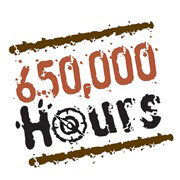My uncle was near death, yet his labored breathing shook the hospital bed, the frame grunting ka-choonk with each exhale. He had arrived at the ER one week before, on Thanksgiving morning, the start of a swift and unexpected decline. A few days earlier, he’d emailed to say he wasn’t feeling well, and might not come for Thanksgiving dinner. Now he was comatose as death, plodding and indifferent, extinguished his suddenly frail 72-year-old heart.
My uncle and I in Tidwells, Virginia, in October 2016, about one month before his death.
My sister and I were his only family, and he was a weirdly wise, eccentric figure in our life. My uncle once biked from D.C. to Montreal, without training or quitting smoking (both kinds). He lived for 20 years in a Kaczinski-like house on a Virginia farm with no electricity or running water (though rumbling generators powered his DVD player). He worked, and abruptly quit, an incalculable list of jobs, from van painter to fence builder, from sous chef to chauffeur. It was a life lived on his own terms—until he arrived in the ER.
I was standing with my sister in his hospital room (a room he’d described as a prison), when the hospital chaplain strode inside. He was a big man, round and tall, his sky-blue suit a cheery contrast to the grey afternoon. As I shook his hand, I didn’t tell him that my uncle was not religious. I didn’t say that I shared his skepticism, or that lately I’d felt a cynicism unusual for me: The sense, as so many people feel, that we’re all shouting at each other, isolated in the cocoons of our own ideas; lecturing without listening as the bitter angels of our nature roar and stomp and spew.
But I didn’t say that. The chaplain wanted only to provide comfort.
“What can I do,” he asked. I wasn’t sure how to respond.
“A prayer would be nice,” my sister said.
He smiled. And then he stepped to the bed and placed one brown hand on my uncle’s bald white head. He grasped his pale fingers with the other, and bent toward the sallow face and the closed eyes, and he spoke in tender tones. I don’t know what divine reassurances he provided. I don’t know whether my uncle, in his morphine state, could even hear the chaplain’s voice. But it was a moment of serene kindness.
And I cried. I am not a crier. I cried because, well… it was beautiful. One stranger comforting another. A stranger not giving a damn about religion, race, politics, or wealth. A stranger wanting only to provide peace.
I saw these generous gestures again and again during my uncle’s stay at Frederick Memorial Hospital. I saw it in the ER, when our uncle was hungry, and the nurse brought him turkey and stuffing and mashed potatoes—food the staff had brought for their Thanksgiving meal. I saw it when he lay unconscious and my sister silently held his hand. I saw it when a nurse calmly wiped bloody drool from his lips, as we learned that death is not as tranquil as it seems on TV. I saw it when he was moved to a hospice room and a nurse stroked his forehead.
“It won’t be long,” she said.
I saw kindness, and tenderness, from doctors, nurses, staff. They provided care, yet respected his polite desire, at times, to not receive care. They were his advocates, his council, his nurturers. They were white and black, Hispanic and Asian, Christian and Muslim. They were America. They were humanity.
Two days before he died, my uncle unexpectedly rebounded, as the dying often do. The attending physician wondered aloud about sending him to a nursing home. We all silently shuddered at the idea. He was still going to die. To linger in a nursing home seemed an awful alternative.
When the doctor left, our uncle said, “Can’t I just stay here?”
It was a tribute to the care. The prison was now a sanctuary. And for me, it was a reminder: In an often bellowing, belligerent world, kindness is out there. It doesn’t boast. It’s easy to overlook. But it lives. And for that, on Thanksgiving, I now give thanks.
Ken Budd is the author of The Voluntourist and the host of 650,000 Hours. Sign up here for the monthly 650,000 Hours newsletter!

